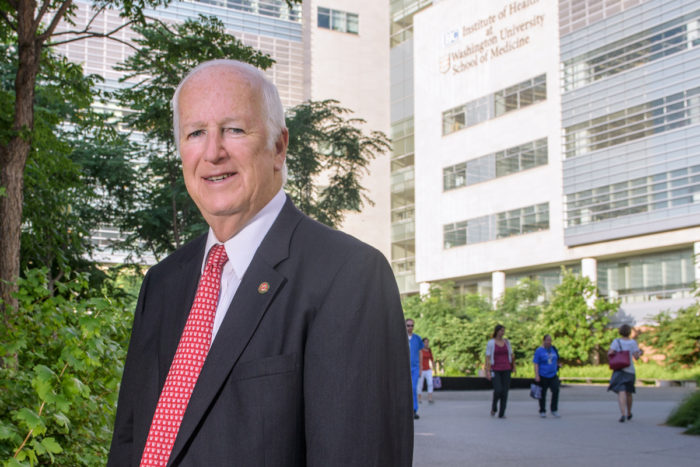Shapiro to lead University of Hawaii physicians
He served as dean of the School of Medicine from 2003 to 2015
 Tim Parker
Tim ParkerLarry J. Shapiro, MD, former dean of Washington University School of Medicine in St. Louis, has been named chief executive officer of University Health Partners of Hawaii, the faculty practice at the University of Hawaii John A. Burns School of Medicine. He begins his new position Aug. 1.
Larry J. Shapiro, MD, dean emeritus of Washington University School of Medicine in St. Louis, has been named chief executive officer of University Health Partners of Hawaii, the faculty practice at the University of Hawaii John A. Burns School of Medicine. The appointment is effective Aug. 1.
Shapiro, a beloved administrator, pediatrician, genetics researcher and mentor, served as executive vice chancellor and dean of the School of Medicine from 2003 to 2015. Under his leadership, the medical school greatly expanded its clinical programs, recruited outstanding faculty and students and strengthened the research enterprise, remaining one of the top recipients of research funding from the National Institutes of Health (NIH).
“We extend our heartfelt congratulations to Larry Shapiro, and we are very appreciative of the legacy he leaves at Washington University,” said Chancellor Mark S. Wrighton. “He is an exceptional, devoted leader and will always be remembered for his extraordinary vision, compassion and sense of humor. His many talents enabled him to expand and enhance the programs of the School of Medicine, and in addition to launching the Institute of Public Health, his efforts to build bridges between the School of Medicine and the Danforth Campus have strengthened Washington University overall. I will miss Larry Shapiro’s full-time engagement with us, and I wish him another successful chapter in his distinguished career, but I am very pleased that he will remain involved with Washington University as a participant in our McDonnell International Scholars Academy and as an active alumnus.”
At the University of Hawaii, Shapiro will lead the physicians of University Health Partners of Hawaii, who provide medical services to the public as well as teach and mentor the medical school’s students, residents and fellows.
“Serving Washington University School of Medicine has been an enormous privilege,” Shapiro said. “It is a remarkable place, with many amazing and talented individuals who work, study and teach here. I have been associated with Washington University for more than 50 years as a student, a parent and a faculty member. I owe an enormous debt to the many people that have meant so much to me during that span of time. I look forward to new challenges and rewards in Hawaii, where my focus will be on enhancing the delivery of high-quality, patient-centered care. Carol and I plan to return to St. Louis often, and I will continue to represent the University in Japan for the McDonnell International Scholars Academy. St. Louis will always own a part of our hearts, and we will make every effort to remain connected in other ways as well.”
Among his myriad accomplishments at the School of Medicine, Shapiro was instrumental in bringing together basic scientists and clinical researchers from different disciplines to address the important questions in biomedical science and translate research findings into new therapies for patients. He also enhanced the School of Medicine’s relationship with BJC HealthCare and was a strong advocate for diversity and gender equality at the medical school.
A pediatric geneticist by training, Shapiro has a long history at Washington University. He received both his undergraduate and medical degrees from Washington University and completed his residency at St. Louis Children’s Hospital before embarking on his medical career, which took him to the NIH and the University of California, Los Angeles, where he was a Howard Hughes Medical Institute Investigator.
He then moved to the University of California, San Francisco (UCSF), where he was a professor and chair of the Department of Pediatrics and chief of pediatrics at the UCSF Children’s Hospital, before returning to the School of Medicine as dean.
Among his many other accomplishments, Shapiro has been the vice chair of the Council of the Institute of Medicine of the National Academy of Sciences; a member of the American Academy of Arts and Sciences; and a fellow of the American Association for the Advancement of Science. He also has served as president of several medical organizations, including the American Society of Human Genetics and the American Pediatric Society, and is past chairman of the Association of American Medical Colleges Advisory Panel for Research and past chair of the board of directors of the Association of Academic Health Centers.






